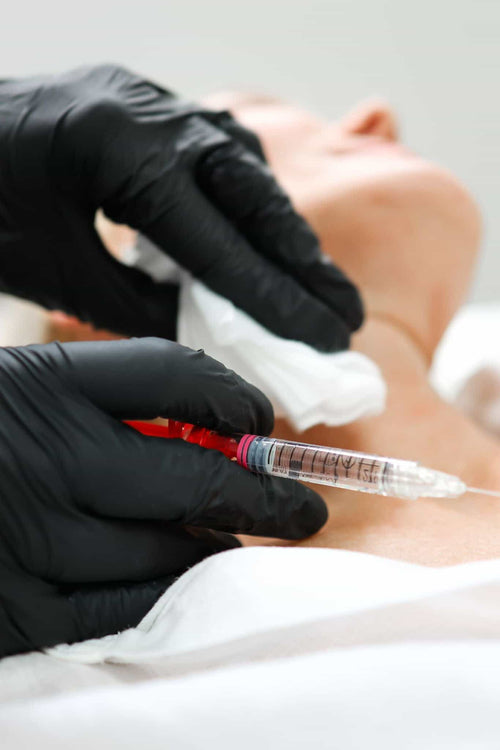Arrange Your Dermal Filler Consultation with Dr. Laura Geige
## Safety Considerations
It’s crucial to understand that using any cosmetic injectables, including fillers, during pregnancy requires careful consideration and consultation with a qualified medical professional. The effects of these substances on a developing fetus are not fully understood.
During pregnancy, hormonal fluctuations and physiological changes can significantly impact how your body reacts to medications and procedures, including lip fillers.
While some studies suggest that hyaluronic acid fillers, commonly used for lip augmentation, are generally considered safe during pregnancy, it’s essential to err on the side of caution.
Here’s why seeking professional medical advice is paramount:
Your doctor can assess your individual health history and any potential risks associated with filler injections during pregnancy.
They can discuss alternative non-invasive cosmetic options that may be safer during this period.
If you’ve had lip fillers before, your doctor can advise on the best course of action regarding dissolving existing fillers, if necessary, while taking into account any potential risks to you and your baby.
Reserve a Dermal Filler Appointment with Dr. Laura Geige Now
Remember, prioritizing your health and the well-being of your developing baby is crucial. Open communication with your doctor about any cosmetic procedures you’re considering during pregnancy is essential for making informed and safe decisions.
Hormonal Changes
Potential Risks to Pregnancy
Procedure Details
Pregnancy significantly impacts a woman’s body and can make certain medical procedures riskier.
While lip fillers are generally considered safe when administered properly, there are potential risks associated with getting them dissolved during pregnancy.
Here are some key considerations:
- Hormonal Changes: Pregnancy brings about dramatic hormonal fluctuations which can affect the body’s healing process and increase the likelihood of complications.
- Blood Flow: Increased blood flow during pregnancy can lead to faster absorption of substances injected into the body, potentially causing unexpected or uneven results with filler dissolution.
- Allergic Reactions: The risk of allergic reactions to fillers and dissolving agents may be heightened during pregnancy due to immune system changes.
- Impact on Fetal Development: Although research is limited, some experts express concern about the potential impact of filler components and dissolving agents on fetal development.
It’s important to note that hyaluronic acid fillers are generally considered safer than other types due to their biocompatibility and gradual breakdown in the body.
However, even with hyaluronic acid fillers, dissolving them during pregnancy carries inherent risks.

Procedure Details for Dissolving Lip Fillers:
- Hyaluronidase, an enzyme that breaks down hyaluronic acid, is typically used to dissolve the filler.
- The procedure involves injecting hyaluronidase directly into the treated areas.
- It may require multiple injections depending on the volume of filler and the individual’s response.
- Dissolving fillers can cause some temporary swelling, bruising, and redness.
Recommendation: Consult with a qualified dermatologist or plastic surgeon who specializes in pregnancy-related cosmetic procedures. They can assess your individual situation, weigh the potential risks and benefits, and provide personalized advice.
Remember, prioritizing your health and the well-being of your baby is paramount during pregnancy.
Dissolving Process
Finding a Qualified Practitioner
## Aftercare and Recovery
Finding a qualified practitioner is crucial for any cosmetic procedure, especially when considering pregnancy or breastfeeding. Look for a board-certified dermatologist or plastic surgeon with extensive experience in dermal fillers and a proven track record of safe and effective treatments.
It’s essential to discuss your medical history, including your current pregnancy or breastfeeding status, in detail during the consultation. A qualified practitioner will assess your individual circumstances and advise you on the best course of action.
Aftercare instructions are paramount for ensuring optimal healing and minimizing potential complications. Your practitioner will provide detailed guidelines specific to your treatment, but general recommendations typically include:
• Avoid touching or massaging the treated area.
• Apply a cold compress to reduce swelling.
• Protect the area from sun exposure.
• Avoid strenuous activities and excessive heat.
Follow-up appointments are essential for monitoring your progress and addressing any concerns. Your practitioner will assess the results and make adjustments as needed.
Recovery time for lip filler dissolution varies depending on individual factors, but it generally involves some temporary discomfort, swelling, and bruising. Most patients experience noticeable improvement within a few weeks.
Remember that your health and well-being are paramount. If you have any questions or concerns about lip filler dissolution during pregnancy or breastfeeding, consult with your doctor or a qualified practitioner for personalized advice.
Managing Discomfort
Follow-Up Appointments
Secure Your Dermal Filler Appointment with Dr. Laura Geige
Cleveland Relationship Therapy One One Three Online James Martin Live
- Why Does Lip Filler Migration Happen - November 4, 2025
- What Is The Best Time Of Year To Get Bum Filler Injections? - November 3, 2025
- What Are The Best CBD Gummies For Sleep And Pain Relief - November 1, 2025
